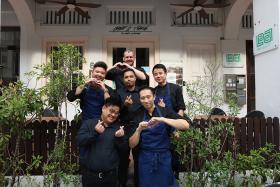Coffee shops get smart to beat manpower crunch
From digital ordering systems to robots, the humble coffee shop is using tech to become more efficient
Imagine ordering kopi-o through a digital screen. Instead of coins, you use your ez-link card to pay.
After a few minutes, a robotic voice announces your order number, which is also displayed on a screen.
You walk up to the centralised counter at the front of a coffee shop, collect your drink and enjoy it in air-conditioned comfort.
This is not a fancy cafe in some upmarket neighbourhood - it is FoodTastic, a new "coffee shop of the future" at Choa Chu Kang that opened in May.
The humble coffee shop, a familiar heartland feature, is an integral part of Singapore life.
Hainanese and Foochow settlers were pioneers of the coffee shop scene in colonial Singapore, joining the trade because of a lack of job opportunities.
Many coffee shops in Singapore are still owned by people of those dialect groups, but a lack of interest in these jobs has forced some of them to put up the shutters.
All coffee shops have the same problem with manpower. Some have no choice but to end their businesses, otherwise they have to think of a way out, like us.Managing director of Chang Cheng, Mr Ricky Kok
Sustaining the heartland coffee shop has now become part of a national agenda to transform the economy.
There are close to 970 coffee shops and foodcourts here, which employ 13 per cent of the total food services workforce, or 20,800 workers.
Under the Food Services Industry Transformation Map (ITM), Spring Singapore and the Housing Board will implement a pilot tender system that encourages operators to innovate and transform from traditional formats into more efficient ones. And coffee shop operators are taking note.
When a tender was called for two productive coffee shops last September, the interest was strong.
Productive coffee shops are among the innovative business formats identified under the Food Services ITM, in which food companies can adopt to use less manpower and better meet consumer needs.
A total of 16 individuals and companies - from well-known foodcourt chains such as Kopitiam to new players like VendCafe, which supplies ready-made meals through a vending machine - submitted bids and proposals for a coffee shop inChoa Chu Kang Avenue 1.
Chang Cheng, which offered $48,000 for the monthly rental of a 4,000 sq ft space, clinched the tender.
Its competitors also placed attractive, and auspicious, bids; offers ranged from $24,168 to $81,881.18.
EVALUATION
On top of rental, the tender evaluation allocates a 50 per cent weightage on productivity improvement and quality of jobs.
Factors include the use of technology and automation, layout redesign, off-site central kitchens and on-site shared kitchens.
Chang Cheng scored 45 out of 50, one of the highest among the applicants.
The other productive coffee shop, Happy Hawkers in Tampines Street 86, is run by another home-grown coffee shop chain. Koufu.
Chang Cheng, which runs more than 220 food outlets and 28 coffee shops islandwide, named its new coffee shop FoodTastic and built it at a cost of $1.8 million.More than $1 million was spent on the "high-tech" elements of the productive coffee shop.
Besides digital ordering systems, it also uses an automated floor cleaning robot, a tray clearing system, as well as an automated dish sorting and washing machine.
Managing director of Chang Cheng, Mr Ricky Kok, 48, told The New Paper that the investment has been necessary due to labour shortages. In fact, the company's growth has been hampered in the past five years due to manpower issues.
In an interview at FoodTastic last week, Mr Kok said in Mandarin: "It is an enormous investment, but I am confident of earning it back over time.
"All coffee shops have the same problem with manpower. Some have no choice but to end their businesses, otherwise they have to think of a way out, like us."
With new technology, FoodTastic's manpower need is 60 per cent lower compared to Chang Cheng's other coffee shops.
While Mr Kok is confident that customers will eventually warm up to the high-tech coffee shop, he admitted that it has been easier for FoodTastic customers in particular, who are mainly young families at a newly completed HDB development.
But veterans in the industry are not sure if older customers will be as understanding or adaptable, as more of such coffee shops pop up.
THREE MORE SITES
Following the launch of the first two productive coffee shops, the tender for three more sites will be launched soon.
The Government targets to have 100 such coffee shops by 2020.
Existing coffee shops are also encouraged to go digital.
Senior Minister of State for Trade and Industry Sim Ann told Parliament in May that approximately 1,400 food outlets, or 20 per cent of all establishments, have adopted some form of digital services.
The aim is 50 per cent adoption rate of digital service across all food and beverage outlets by 2020.
But Mr Hong Poh Hin, chairman of the Foochow Coffee Restaurant and Bar Merchants Association, which represents 400 coffee shops here, told TNP that the investment is too high if usage of high-tech features such as cashless payments, which can cost "thousands of dollars" are not utilised enough.
"It also depends on where the coffee shop is located. If it is a neighbourhood coffee shop, the elderly would be hesitant to use the machine. It would be a waste of money for the stall owner."
Founder of Chang Cheng says coffee shop business is 'recession-proof'
The coffee shop business has been lucrative and has produced several rags-to-riches stories.
These include Mr Hoon Thing Leong of the Kim San Leng coffee shop chain, as well as Kopitiam's Lim Bee Huat, who both started out as a "kopi kia" (Hokkien for coffee boy).
Chang Cheng's Ricky Kok, who is from Malaysia, has a similar story.
Fifth in a family of six children, Mr Koh, now 48, came to Singapore to work as a cook when he was 15 and had just completed Secondary 2 education. He worked long hours,and the pay was only $350 a month.
In 1994, after 10 years of working here, he borrowed $12,000 from his brother to open his first stall, selling mixed rice at a coffee shop in Toa Payoh. Business was bad at first but he was determined to succeed - a promise he made at his parents' graves after they died in a car accident when he was 21.
Over the next 23 years, his business grew - it runs more than 200 food outlets and 27 coffee shops islandwide - and has since expanded to Malaysia, with plans to expand to China next year.
Despite the humble image of Housing Board coffee shops, jaw-dropping deals involving them have hit the news in recent years.
Mr Kok's brother, former Chang Cheng director Kok Kuan Pow, was behind the record $31 million sale of a coffee shop in Bukit Batok in 2015.
Earlier this month, Chinese newspaper Shin Min Daily News reported that coffee shop chain Broadway is in the process of finalising a $300 million deal to buy over S11's 17 coffee shops.
Mr Kok, a father of four children aged five to 19, told The New Paper: "The coffee shop business is recession-proof. Every one will have their own opportunities to earn money.
"But it is hard to attract young and educated locals to the industry especially with the pay. Some in the business will dissuade their children from taking over because of the hard work. Still, I will encourage my children to join the business because it is a good industry.
"But only after they turn 25."
- LINETTE HENG
Get The New Paper on your phone with the free TNP app. Download from the Apple App Store or Google Play Store now





